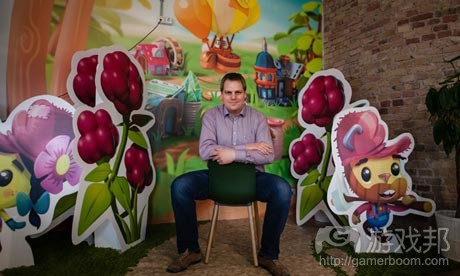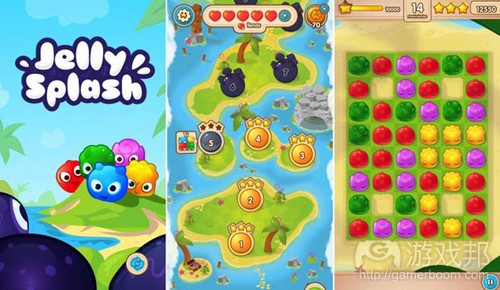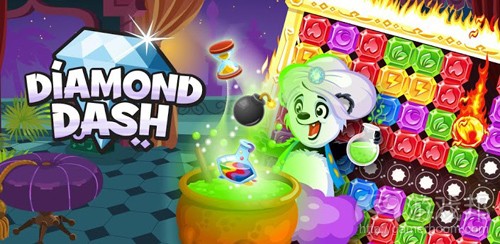Jens Begemann:Wooga志在面向全球用户设计游戏
作者:Dean Takahashi
Wooga工作室是众多正在进军手机游戏领域的社交游戏公司之一。在过去8周里,Wooga的消除游戏《Jelly Splash》在iOS平台获得超过1000万下载量。
在本次采访中,Wooga的CEO Jens Begemann透露了他们制作《Jelly Splash》付出了不少努力。这款游戏有一些与《Candy Crush Saga》、《Bejeweled》和《Dots》相同的特征。
以下是我们采访的文字记录。
GamesBeat(以下简称G):Wooga最近有什么新动向?
Jens Begemann(以下简称J):我们8周前发布了一款游戏《Jelly Splash》。它在应用商店的免费排行榜的第一名上坚持了很多天,现在是美国和其他几个国家的应用收益排行榜的前20名。它仍然迅速发展。那款游戏现在有1000万的下载量。我们最近又把它推向Facebook了,周一将登录Android平台。
G:这款游戏你们做了多久?
J:差不多有一年吧。它的玩法相当简单,但这些简单的游戏——学习容易精通难的游戏,却是最难调整的。它有些类似于《Candy Crush Saga》这种游戏。我们在2010年给一款叫作《Bubble Island》的游戏做了这个地图,然后放进其他游戏中。
玩法是非常简单的。你画线把这些具有相同颜色的果冻连起来……跟《Dots》有点像,但它是分关卡的游戏,还可以连斜线消除……总这很简单。当达到足够的得分,你就通关了。但关卡会越来越难。如果你回到地图,你可以选择更难的关卡……这款游戏有180多关,目标会经常变化。
《Jelly Splash》已经风靡全世界了。我们只用了8周的时间就把它放到iOS、Facebook和Android三大平台上,我觉得我们的速度比大部人都快了,并且现在已经有1000万下载量了。它绝对是我们目前最成功的一次发布。
接下来我要说的是我们的策略。我们还在赢利,收益差不多翻倍了。今年的利润比去年高了70%。我们的市场巩固了。现在我们的工作重心是复制成功。我们不想在一次成功之后就了无声息。
你大概想问,那么什么是成功?你们如何定义成功?对我们而言,一款游戏如果在它的寿命内收益达千万美元,那就是成功了。我们进入这个市场四年了,按这个标准,我们目前已经成功五次了。《Bubble Island》是第一个成功,然后是《Monster World》、《Diamond Dash》、《Pearl’s Peril》,现在是《Jelly Splash》,虽然它的收益还没超过1000万美元,但指日可待了。我们为此感到自豪。
我们的目标是每年创造两到三次这种成功。今年我们的开发方法稍微改变了。
G:你们现在有多少员工?
J:现在超过250人了。人数仍然在增长。我们打算降低增长速度。我们觉得保持小团队才是正道。我们有人负责后勤和职能如PR或营销或财政或客户服务,但剩下的约200人都从事游戏开发。我们有20支游戏团队。有些团队非常小,可能只有三个人从做原型开始,有些团队比较大。但即使是在小团队,每个人都能发挥重要作用。
我们的人数还在增加,但我们不想增长失控。我们认为理想的团队应该是小规模的,应该把人数控制在合适的范围内。
G:自从《Clash of Clans》和《Puzzle & Dragons》占领市场,我们还没有好好谈谈这些游戏。你们对它们有什么看法?
J:不可思议的成功。不过我们的目标正是经常创造这样的成功。如果做得到,很多其他游戏都能赢利。对于一款收益千万美元的游戏,如果条件都成熟了——时机和市场,那么它就会更加成功。《Clash of Clans》和《Puzzle & Dragons》的成功就是这么来的。比成功更成功,你可以这么说吧。
G:我们最近与EA前CEO John Riccitiello有过谈话。他表示,在游戏机领域,成功的标准是100亿美元。一个品牌要经过五年十年的发展才能做大。按他的意思,有多少人预见了《愤怒的小鸟》在五年内创造的成功?
J:免费游戏是服务。你要天天经营它,它才能天天产生收益。甚至在圣诞节期间,甚至在周末。用法是非常不同的。像《GTA》或《使命召唤》,每年或每几年,它的销量会显著增加,然后再次走低。对于免费游戏,这是持续的。
如果你看看《Clash of Clans》目前创造的总收益,你会发现这个数字小于《使命召唤》的,但已经相差不远了。手机市场快速发展,商业模式也是。你必须迎接这样的未来。如果你回想一下过去10年或20年,你不会在接下来10里获得成功。
G:我们已经看到一些免费游戏走到尽头了。Zynga停运了许多游戏。Kabam也放弃了若干游戏。你认为所有游戏公司都不得不面临这种局面吗?
J:我们不怕中止项目。但我们会在发行以前中止大部分不可行的项目。我们做许许多多原型,每年大约有15款游戏进入生产阶段。我们应该继续这么做吗?这导致我们中止大量项目。如果我们认为某游戏没有成功的潜力,我们就会让它的团队做其他事。但如果我们发布了一款游戏,我们就会努力打造它的成功。如果它成功了,那么它的开发团队的多年努力就没有白废了。
三年半以前,我们发布了《Monster World》。现在仍然有团队在更新它,每周推出一个新版本。我们对此很满意。也许在未来的某个时候,我闪会让那支团队会做其他事。但对我们而言,可持续的长期发展才是重点。甚至你把团队转移走了,你仍然可以保留游戏。前一阵子,我们关闭了一款游戏,但那时它的玩家还有一些玩家,跟在座的人数相当吧(笑)。我们认为,只要游戏还有大量粉丝,就不能让他们失望。你应该至少继续提供服务。
G:每个项目启动时有多少人?
J:两三个人做原型吧。到发布时,大约10-15人。发布后,成功的话,可能是15或20人。这是通常的规模。我们有些游戏是在线的,但我们没有让团队时时跟进。其他游戏如《Monster World》或《Diamond Dash》,一直有团队负责改进和每周的更新。
G:有没有考虑过像Machine Zone那样组建80人的团队,他们花了18个月做出《战争游戏》?
J:我们的团队规模现在越来越大了。我们的寻物游戏《Pearl’s Peril》的团队一度达到30人左右。那样人太多,通信成本太高,还会影响效率和创新。所以我们倾向于控制团队规模。
至于时间表,从原型到发布,仍然是一年。也可能延长至18个月。但我认为团队应该小。如果我们需要添加大量图形,我们有时候会与外部团队合作内容。但我们努力把内部团队的人数控制在15个或以下。
G:你认为你们从Facebook游戏转型到手机游戏,成功吗?
J:我们觉得非常成功。两年以前,我们的手机游戏收益为0,因为我们做的全部是Facebook游戏。我们的Facebook商业仍然运作良好,但手机商业发展极快,其收益现在已经超过我们的总收益的一半了。下周《Jelly Splash》将登录Android平台,到年底我们有可能宣布手机游戏股的新基点。
G:你们曾经取消了一款HTML5游戏。你对HTML5态度还是一样的吗?
J:是的。HTML5面临着两个方面的挑战。一个是技术层面上的,玩家要求更短的响应时间和更顺畅的体验。很多时候他们甚至期望游戏能离线运行。用HTML5是可能实现的,但更加困难。把HTML5游戏变成跨平台游戏是很难的。
第二个是玩家行为。在PC,大部分玩家只运行一个应用——他们的浏览器。他们可以很轻松地从一个网站切换到另一个。在手机,许多玩家极少打开浏览器。他们是从一个应用跳到另一个应用。玩家需要的是屏幕上显示的图标,他们知道通过App Store或Google Play使图标出现在自己的设备上。在浏览上使用HTML5与玩家期待不符,使普及更加困难。
G:你如何看待手机游戏行业的现状,其他手机游戏工作室的发展是否健康?是否所有人都从大市场中获利?
J:整个市场都在转型。不只是手机游戏,游戏机游戏和网页游戏也在革命。我们对手机游戏做了一些分析和估计。每年在iOS上发布的新游戏大约有4万,在Google Play上发布的新游戏也大概达到这个数量。根据我们对成功的定义,虽然我不完全肯定,但似乎有0.2%的游戏达到成功的门槛了。不可能再多了。
有些公司获利颇丰,非常成功。但有更多公司甚至连保本都困难。根据我听说的,大部分公司的钱有去无回。但极少数公司发达了。于是有了大公司兼并小公司的现象,接下来几年会有很多兼并收购吧。
所以我们今年认真地遵循不断给我们复制成功的开发模式。每年大约有15个原型进入生产阶段,其中5个得以做成成品发布,又其中的两三款游戏会成功。今年的重头戏是《Pearl’s Peril》和《Jelly Splash》。今年还没结束,我对接下来的产品仍然有信心。
G:你是否考虑过像你的一些竞争对手一样,求助于第三方发行商?
J:只要游戏好,我们就会发行。我们的核心焦点仍然是成为做游戏的开发者,但我们不排斥其他尝试。我们也与独立开发者合作。
G:但你未必是在投资这些独立开发者。
J:是的,我们不是投资商。如果独立开发者说他们需要营销、推广和本土化的支持,只要我能力所及,我们就可以帮助他们。我们并不供给他们开发经费。
G:我们是否处于游戏全球化的风口浪尖?《愤怒的小鸟》在这方面似乎后劲不足了。你认为你们应该设计一款全球性的游戏吗?
J:真是有趣的问题。我们目睹了《Diamond Dash》等游戏风靡全世界,除了日本、韩国和中国。我们看到不少游戏只能在亚洲东部流行开来。所以仍然有缺口。日本、韩国和中国的市场跟其他地方的不一样。那是我们正在密切关注的。
我们的游戏主要是适用于其他市场的。我们不会设计针对韩国或日本市场的游戏,但我们的眼界是开阔的。我们有一家非常国际化的公司,有40多个来自不同国家的人与Wooga员工在同一个地方办公。每一支团队也都非常国际化。所以,他们不会制作一款非常德国或美国的游戏。我们制作的游戏是适合全球玩家的胃口的。
几年前,人们说免费模式只有在亚洲市场行得通,在欧美市场永远不可能成功。但市场转型了。这是接下来几年应该好好观察的事。这些市场会融为一体,还是仍然保持分离?
G:你如何看待手机网络通讯应用如Kakao、Line和微信?你认为它们会在世界各地普及吗?
J:我们非常密切地关注着这些平台。它们真的很有意思。我们已经得出一些观察结论了。短信平台方面,它们各自占据一个国家市场。比如Line的势力范围是日本,而微信独霸中国,Kakao覆盖韩国。一定程度上,许多人已经用它们取代了手机自带的文本短信功能。
这些平台可以创造新的推广渠道。至于它们会统一不同的市场还是保持分立,这是值得关注的。我们将看到它们之间的激烈竞争。对我们而言,这可能创造一个有趣的新推广平台。(本文为游戏邦/gamerboom.com编译,拒绝任何不保留版权的转载,如需转载请联系:游戏邦)
Jens Begemann on Wooga’s plan to create million-dollar mobile blockbusters (interview)
by Dean Takahashi
Wooga is one of many social-game companies trying to break into mobile. In the past eight weeks, it found its way with Jelly Splash, a color-tile matching game with more than 10 million downloads in eight weeks on iOS.
Jens Begemann, chief executive of Berlin-based Wooga, talked about how much effort went into making Jelly Splash — launching today on Android — which has some unique riffs on games like Candy Crush Saga, Bejeweled, and Dots.
We sat down with Begemann for an interview in San Francisco last week. Here is a transcript of our talk.
GamesBeat: So what’s new at Wooga?
Jens Begemann, CEO of Wooga.
Jens Begemann: We launched a game eight weeks ago, Jelly Splash. It reached number one on the free charts at the App Store for a number of days. It’s now a top-20 grossing game in the U.S. and a dozen other countries. It’s continuing to grow fast. We’re over 10 million downloads now. We’ve also recently launched it on Facebook, and on Monday we’re launching on Android.
GamesBeat: How long did you work on that one?
Begemann: That was roughly a year. It’s relatively simple gameplay, but these simple games — easy to learn, hard to master — those are the most difficult to tune. It has some similarities to games like Candy Crush Saga. We created this map in 2010 for a game called Bubble Island. Then, it was taken over into other games.
The gameplay is very simple. You draw lines and connect these jellies, jellies of the same color. … It’s a bit like Dots, but it’s a level-based game, and you can also go diagonally. … It’s very simple. You just play until you have enough points. But it becomes more complex. If you go back to the map, you can choose a harder level. … We have more than 180 levels, where the objectives constantly change.
It’s become very popular all over the world. We had only an eight-week delay to get it on iOS, Facebook, and Android, which I think is much faster than most people have done it, and we’re already at 10 million downloads. It’s definitely our biggest launch so far.
The other thing we’re talking about is our strategy and how we see Wooga. We continue to be profitable, and we’ve roughly doubled our revenue each year. Revenue is currently 70 percent higher than it was last year. The market is consolidating. It’s much more about hits on mobile now. The key, for us, is to repeatedly bring out hits. We don’t just want to do one hit and live off it.
You can ask, then, what’s a hit? How do you define a hit? To us, it’s a game that does tens of millions of dollars in revenue across its lifetime. We’ve been on the market for four years, and by that standard, we’ve had five hits so far. Bubble Island was the first one, then Monster World, Diamond Dash, Pearl’s Peril, and now Jelly Splash has not yet crossed that $10 million mark, but it will soon. We’re quite happy with that.
Our goal is to create two to three more hits every year. We’ve changed our development approach quite a bit this year.
GamesBeat: How many people do you have now?
Begemann: More than 250 now. A bit more. We’re still growing. We’ve tried to grow a bit slower. We see that really small teams are the way to go. We have a few people in service areas and overarching corporate functions like PR or marketing or finance or customer care, but about 200 of those work in the game teams. We have 20 different game teams. Some of those are very small, maybe three people prototyping something, and some are bigger. But they’re very small teams where everyone has a big impact.
We continue to grow the headcount, but we don’t want to grow crazily. We believe that small teams of the right people represent the best way to go.
GamesBeat: We haven’t talked much since Clash of Clans and Puzzle & Dragons took over the market. What do you think of those developments?
Begemann: They’re crazy successful. Our goal is to regularly create hits, though. If you have that, you can finance lots of other titles. With a game that’s designed to create tens of millions of dollars, if the right things come together — timing and the market — it can become much bigger. That’s what’s happened with Clash of Clans and Gung Ho, a game that was a hit became huge — a super hit, you might call it.
GamesBeat: We talked to former Electronic Arts CEO John Riccitiello recently. He was saying that when you’re in the console space, what you want are the $10 billion properties. The brands aren’t really big until they’ve been around for five or 10 years. He was saying, well, how many people think Angry Birds will be in the top five, say, five years from now?
Begemann: Free-to-play games are services. You run them constantly, and they generate revenue every day. Even during the Christmas holidays, even on weekends, they generate revenues. The usage is very different. Something like GTA or Call of Duty, every year or every couple of years it gets a heavy increase in usage, and then it goes down again. In free-to-play games, it’s constant. To me, that’s worth even more.
If you look at the total revenue that a Clash of Clans has generated so far, it’s still probably smaller than Call of Duty, but it’s not so far away. One of these two markets is growing fast. One of these two business models is growing fast. You have to embrace the future. If you look backward too much, looking at what’s happened in the last 10 or 20 years, you won’t be successful in the next 10 years.
GamesBeat: We’ve seen some free-to-play games end their life. Zynga’s discontinued a lot of titles. Kabam’s discontinued a few. Is that something you’ll expect every game company to have to deal with?
Begemann: We’re very much embracing the notion of stopping projects. But we stop most of them before launch. We do many, many prototypes, and we move about 15 games into production every year. Every four months, we challenge and question each project. Should we continue working on this? That leads us to stop a lot of projects. If we don’t think a game has the potential to become a hit, the team works on something else. But then, when we launch, we work hard on making each game a hit. If it’s a hit, it justifies having a team on it for many years.
We have Monster World, which we launched more than three and a half years ago. There’s still a team on it, with a new version every week. We’re really happy with that. Maybe, at some point in the future, we’ll move that team to something else. But for us, it’s about sustainable long-term growth. Even if you move a team to something else, you can still keep the game online. We had one game some time ago where we switched it off, but at that point it had about as many users as you see in this room [Laughs]. We believe that as long as a game has lots of fans, you shouldn’t disappoint them. You should at least keep the service running.
GamesBeat: How large do your teams get with each game?
Begemann: A team starts with just two or three people making a prototype. At launch it’s between 10 and 15. Post-launch, for a successful game, it can be 15 or 20 people. That’s a typical size. We have some games that are online, but we don’t have a live team working on them. Other games, like Monster World or Diamond Dash, have teams constantly working to improve them every week.
GamesBeat: Have you considered something like the 80-person team at Machine Zone, where they worked for 18 months to come up with Game of War?
Begemann: We were moving in a direction where teams were getting larger. Pearl’s Peril, our hidden-object game, that became about 30 people at some point. That was becoming too big. The communication overhead was quite big. It was not agile enough or innovative enough. So we prefer to keep the teams smaller.
Timeline-wise, from prototype to launch, it’s still a year. It can be more than that, up to 18 months. But I think the teams should be small. If we need to add lots of graphics, sometimes we’ll work with external partners to deliver more content. But we try to keep the core team inside the company to 15 people or less.
GamesBeat: Do you consider your transition to mobile successful, then?
Begemann: Very much for us. Two years ago our mobile revenue was zero. It was all Facebook. Our Facebook business is still going well, but mobile is growing so fast that it’s now more than half of our revenue. With the Android launch of Jelly Splash next week, we may be ready to announce a new benchmark in terms of mobile share toward the end of the year.
GamesBeat: You guys had an HTML5 game that you canceled. Do you still feel the same way about HTML5?
Begemann: Yes. The challenge on HTML5, it’s two things. One is on a technological level. Users are demanding an excellent experience in terms of response time and how smooth everything feels. In many cases they expect the game to work offline. That’s possible with HTML5, but more difficult. Getting that cross-platform is tough.
The second thing is that the behavior of users is different. On the PC, most people only have one app running. That’s their browser. They’re happy with switching from one website to another and entering websites. On mobile, a number of users rarely open their browser. They’re hopping from one app to another. What people want is an icon on their device, and they’ve learned that how you get that icon on your device is through the App Store or Google Play. The learned user experience is very much about apps. Using HTML5 in the browser goes against what users have learned. It makes adoption much harder.
GamesBeat: How do you look at the rest of the mobile landscape and whether all these mobile game studios are healthy or not? Is everyone collectively benefiting from a larger market?
Begemann: The whole market is in a big transition. It’s even broader than just inside mobile. If you look at console and browser, everything is changing. Looking at mobile, we’ve run some numbers and done some estimations. About 40,000 new games launch every year on iOS and about the same number on Google Play. Not quite a thousand a week. By our definition of a hit, I’m not completely sure on this, but it seems like about .2 percent of games cross that threshold. No more.
Some companies are benefiting a lot and are extremely successful. Many others struggle to earn their development costs back. From what I hear, most companies don’t make their money back. But a few are super successful. This leads, I think, to consolidation. That will happen over the next few years.
That’s why we’ve put so much focus this year on creating this development funnel where we repeatedly produce hits. About 15 prototypes a year go into production. Five launch. Two to three become hits. This year, that’s been Pearl’s Peril and Jelly Splash so far, and the year’s not over. I’m optimistic for what’s coming next.
GamesBeat: Have you thought about doing things like some of your competitors and going into third-party publishing?
Begemann: If the right game comes along, we would publish it. Our core focus is still being a developer and creating games, but we’re open to that. We’re talking to independent developers about it.
GamesBeat: But you’re not necessarily seeding those kinds of companies.
Begemann: No. We’re not an investor. If an independent developer is there and they say they want the marketing power and the distribution power and the reporting systems and the ability to localize that we have, then we can help them with that. We wouldn’t finance development.
GamesBeat: Are we on the cusp of globally appealing games? Angry Birds kind of ran out of gas in that respect. Do you think that you actually need to design a global game?
Begemann: It’s a very interesting question. We have seen games like Diamond Dash become successful all over the world, except in Japan, Korea, and China. And we’ve seen a lot of games that are only successful in east Asia. There’s still this chasm, if you want to call it. Japan, Korea, and China work differently. That’s something we’re watching very carefully.
We design our games more for the rest of the world. We don’t design our games specifically with Korea or Japan in mind. But we look at everything. We have a very international company. More than 40 nationalities work for Wooga in the same office in Berlin. Every team is very international too. So, they don’t create a game that’s just German or American or whatever. We create games that fit a global taste.
A few years back, people said that things like free-to-play would only work in Asia, and they’d never work in the West. But they’ve made the transition. That will be something to watch in the next few years. Will these markets come together, or will they still stay separate?
GamesBeat: What do you think of mobile-messaging networks like Kakao and Line and WeChat? Do you think they’ll catch on elsewhere in the world?
Begemann: We watch those platforms very closely. They’re extremely interesting. We may have something to announce on that. In terms of the messaging platforms, they’re separated by country. Line dominates Japan. You have WeChat in China and Kakao in Korea. To a smaller degree, What’s App is strong in Europe. It’s replaced text messaging for many people.
These platforms can be an additional distribution channel. It’ll be interesting to see if they unify or remain separated from market to market. We’ll see how they compete against each other. To us, when it’s right, it could be an interesting additional distribution platform.(source:venturebeat)











































 闽公网安备35020302001549号
闽公网安备35020302001549号